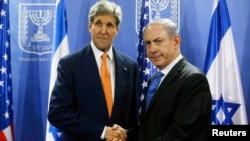Sunday's talks in Rome between U.S. Secretary of State John Kerry and Israeli Prime Minister Benjamin Netanyahu will take place during a critical time in the Middle East.
Kerry, speaking with reporters Friday during a visit to Colombia, said the United States was seeking to avoid a year-end showdown at the United Nations over proposals for Palestinian statehood.
Palestinians, meanwhile, were still mourning the loss of Cabinet minister Ziad Abu Ain, who died Wednesday after a confrontation with Israeli troops.
Kerry said he would be discussing possible U.N. resolutions about the Israeli-Palestinian conflict, including proposals supporting Palestinian statehood, with Netanyahu.
In a Friday briefing, State Department spokeswoman Jen Psaki said that "there are a number of countries out there who have taken their own action, even nonbinding action. So this is an appropriate time to have the discussion.”
Jordan has circulated a draft resolution calling for U.N. support for a Palestinian state. Israel has long objected to such a measure without a peace agreement between the two sides. Kerry tried to broker a peace deal between Israeli and the Palestinians, but it collapsed in April.
Israeli campaign
Any U.N. action now that moves the Palestinians closer to statehood would put an internal strain on Netanyahu. He is campaigning for re-election after Israel’s parliament voted to dissolve and hold early elections, following the breakup of his coalition government.
Washington Institute Middle East analyst David Makovsky said the timing for possible U.N. action could not be worse.
"This is all political dynamite in the Israeli election," he said. "I hope that the issue will be deferred.”
Wilson Center analyst Aaron David Miller said there might be no movement on this or other issues during Kerry’s talks with Netanyahu.
“I think that Kerry needs and wants to keep his hand in maintaining this contact with Netanyahu now, particularly when any number of things have emerged that could create additional problems," he said.
Kerry held separate meetings with Netanyahu and Palestinian President Mahmoud Abbas in Jordan last month in a bid to reduce tensions and breathe life into the stalled peace talks.
Makovsky said that ultimately, the Israelis and the Palestinians will have to learn how to live with each other. “There is too much history," he said. "There is too little geography over there.”
Attacks in Athens, West Bank
Earlier Friday, Israelis and Israeli interests came under attack.
In Athens, gunmen fired shots at the Israeli Embassy. No one was injured in the overnight attack in Greece, which Israeli authorities blamed on Palestinian "incitement."
In an incident in the Israeli-occupied West Bank, a Palestinian man threw what was believed to be acid on an Israeli family. Four children were said to have been injured.
And in Israeli-occupied Gaza, an explosion damaged a French cultural center. The building has been closed since a previous explosion in October.
Jerusalem has recently seen a wave of unrest, including regular protests, clashes and occasional small-scale but deadly attacks by Palestinians on civilians and official targets in Israel.
Authorities boosted the police presence in the city, fearing that protests could escalate following midday prayers. Public anger continued to simmer over Abu Ain's death.
Kerry called Palestinian President Mahmoud Abbas on Friday to express his condolences over the loss of Abu Ain.




